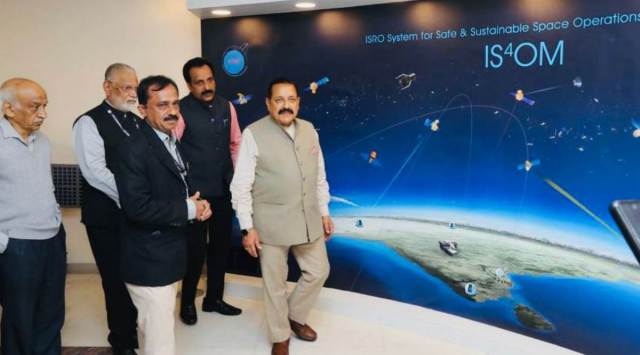‘IS4OM to safeguard Indian space assets, mitigate collision threats from space objects’
The ISRO stated that the facility will support all routine operations safeguarding Indian space assets, mitigating collision threats from space objects through specific collision avoidance manoeuvres.
 Union Minister Jitendra Singh at the inauguration.
Union Minister Jitendra Singh at the inauguration.The ISRO System for Safe and Sustainable Operation (IS4OM) was inaugurated by Union Minister of State (Independent Charge) Science & Technology Dr Jitendra Singh at the Indian Space Research Organisation (ISRO) Control Centre in Bengaluru Monday.
The ISRO stated that the facility will support all routine operations safeguarding Indian space assets, mitigating collision threats from space objects through specific collision avoidance manoeuvres.
The control centre would facilitate the intensified activities foreseen for Space Situational Awareness & Management (SSAM) in view of increasing debris population and operational space assets. The control centre would host a range of activities pertaining to protection of Indian Space assets from inactive satellites, pieces of orbiting objects, near earth asteroids and adverse space weather conditions. It would assimilate the tracking data of inactive satellites from indigenous observation facilities and generate useful information from bare observations through analysis. For sustainable use of space, the control centre would enable research activities pertaining to active debris removal, space debris modelling and mitigation, ISRO said.
Secretary (Department of Space) S Somanath said: “Infrastructure for space weather monitoring and forecast plays a critical role in protecting space-based as well as ground-based infrastructure from critical solar activities. On an equal footing, detection and prevention of asteroid impacts are essential for human welfare. Vision of IS40M towards space weather services and planetary defence initiatives are also to be important areas of Space Situational Awareness (SSA).”
He added that the facility has been equipped with necessary software, systems and other analytical capabilities. “This is a first step towards the programme. We need to have our own data and our own observations for all the space objects. We need to contribute to global efforts towards sustainable space activities,” Somanath said.
Around 60 start-ups have registered with ISRO since “unlocking” of the Indian space sector recently by Prime Minister Narendra Modi, and quite a few of them are dealing with projects related to space debris management. The other start-up proposals vary from nano-satellite, launch vehicle, ground systems, research, and so on, Singh said.
The minister reiterated that the passion of private players and innovative start-ups will augment the role of the Department of Space in protecting India’s interests in space by developing all-round capabilities in the domains of space transportation, debris management, infrastructure and applications.
Complimenting the contribution of ISRO, he said: “While Neil Armstrong went to the moon, he couldn’t find a trace of water on it; it was our Chandrayaan mission that ultimately found the trace of water. The contribution of ISRO towards space activities is immense.”
Singh said, “IS4OM facility will aid India in achieving its SSA (Space Situational Awareness) goals by providing a comprehensive and timely information of the space environment to users. This multi-domain awareness platform will bring prompt, accurate and efficient information on on-orbit collision, fragmentation, atmospheric re-entry risk, space-based strategic information, hazardous asteroids and space weather forecast.”
He highlighted that ISRO has been taking necessary measures to safeguard all its space assets from intentional and accidental close approaches by space objects including operational spacecraft and space debris objects. He added that Space Situational Awareness activities have many strategic implications such as identifying and monitoring other operational spacecraft with close approaches, having overpass over Indian region, intentional manoeuvres with suspicious motives and re-entry within the Indian region.
“The importance of radars and optical telescopes as the main ground-based facilities for tracking space objects including space debris needs to be highlighted, as accurate orbital information from such ground-based sensors is a prerequisite for mitigating any collision threats to an operational space asset from other objects. The backbone of the SSA system is the network of observational facilities in which the nation is lagging behind other space-faring nations. It is required to set up necessary Indian observational facilities for a meaningful and value-added SSA system development and alerts generation,” the minister added.
Singh said, “Given the ubiquitous applications of space technology in day-to-day life, the Long-Term Sustainability (LTS) of outer space activities is of paramount importance to ensure that the outer space remains utilizable to the future generations of mankind.”







